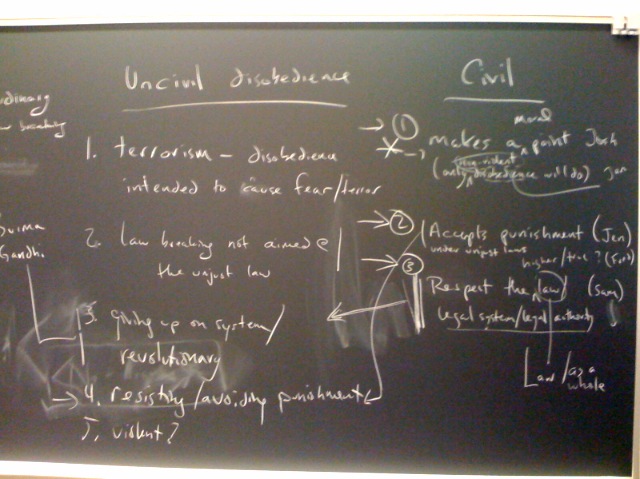
Socrates obeyed what he regarded as an unjust verdict. Crito offered him an easy escape but instead he went to his legally mandated death despite believing that the conviction and sentence were wrong.** He makes his case in the Apology.
Martin Luther King, Jr. disobeyed what he regarded as an unjust application of the law. He helped organize a parade without a permit on the grounds that doing so was necessary to reform the unjust system of legalized racial segregation.
We talked about their different positions. With Socrates, we were primarily interested in evaluating his arguments. With King, we focused on what distinguishes civil disobedience from other, less civil, kinds.
Socrates’ claim that disobedience would destroy the laws is silly. Therefore, so his is claim that doing so would involve an intention to destroy the laws.
At least, that’s what I think. Socrates had some able defenders and it would be presumptuous of me to insist that I’m right. Fortunately, what I want to say doesn’t depend on settling the issue. This is because even I think there’s a good point in what Socrates said. It’s this. Accepting a legal authority involves accepting its judgments apart from your own judgment of the merits of the case.
When I say “apart from”, I mean the fact that a judgment came from the authority is, all by itself, a reason for accepting that judgment. Thus, if you heard that the legal authority had decided citizen Q was guilty of a crime, you would have a reason to accept Q’s guilt even before you had heard any of the evidence or even what the charge was.
What I do not mean is that the fact that a judgment came from an authority is, all by itself, a conclusive reason for accepting that judgment. Thus, once you heard the evidence, you might conclude that Q is, in fact, not guilty, despite the fact that the authority reached the opposite conclusion.
In other words, the laws only work if we give the judgments of legal authorities weight on their own, apart from our own beliefs about the merits of their decisions. But we need not give the authorities’ judgments absolute weight. Crito rejected legal authority to the extent that he urged Socrates simply to substitute his own judgment for that of the legal authorities.
Socrates’s understanding of legal obligation rests a lot on analogies with personal morality. He holds that there are two reasons why we are obliged to obey the laws.
We pushed on the strength of these analogies, particularly as they apply to Socrates’s specific case.
We also raised questions about one of Socrates’s premises: one must never do a wrong in response to a wrong. We asked whether disobedience would really be a wrong or be harmful to the laws.
King thought that at least some kinds of disobedience in some circumstances could improve the laws rather than harming them.
We spent the bulk of our time talking about exactly how to characterize the disobedience that King had in mind. It certainly isn’t the kind of disobedience involved in ordinary crime, for instance.
Nor, in my opinion, was King’s civil disobedience meant to be revolutionary. It worked resolutely within the state rather than seeking its overthrow or illegal modification. In other words, King did not seek to go outside of the normal process to install a new government friendly to the civil rights movement. He sought to persuade the existing one or, if that didn’t work, to elect a new one in the normal way.
We looped around the issue of terrorism a number of times. I said that it seemed to me that there is an important difference between trying to achieve your aims by instilling terror in your opponents and doing so by making an articulate point.
We also noted a similarity between Socrates and King: they both accepted the legal system’s punishment.
I’m just scratching the surface here. Plus, it’s getting late: it’s almost 9 pm! Bed time!†† I’m not kidding. So here, courtesy of Jonathan, is as succinct a summary of our conversation as I can provide. Thanks Jonathan! 